#unionism
Text
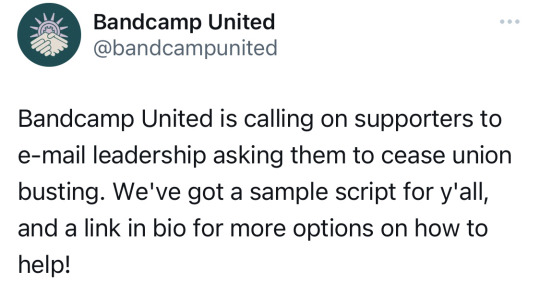

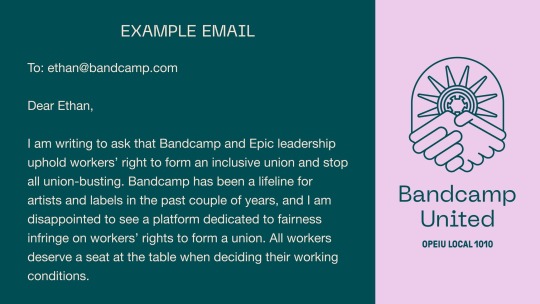
Another union shout out — Bandcamp workers are organizing with Tech Workers Union Local 1010 and need your support! Email [email protected] with your support for the workers and their right to organize, and follow Bandcamp United on twitter to keep up with their campaign for equity in the workplace.
edit: embedded link to their linktree !
6K notes
·
View notes
Text
youtube
Oy, Ir Narishe Tsionistn / Oh, You Foolish Little Zionists performed by Oy Division, Daniel Kahn & Psoy Korolenko
#anti-zionism#jewish#leftist music#music#video#daniel kahn#oy division#psoy korolenko#yiddish#free palestine#palestine#israel#Youtube#working class#socialism#communism#der bund#unionism
22 notes
·
View notes
Text
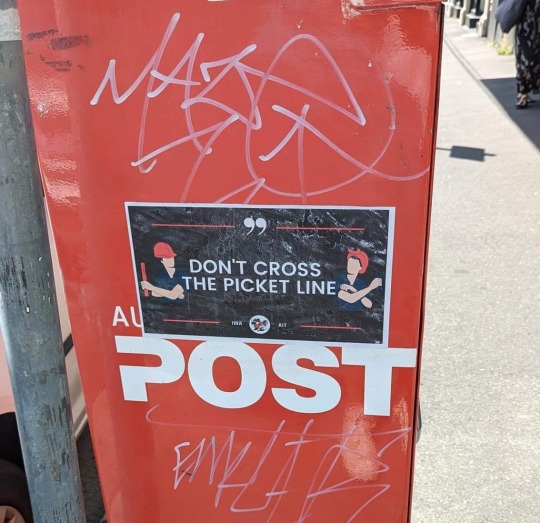
"Don't Cross the Picket Line"
IWA/AIT poster spotted in Fitzroy, Melbourne
118 notes
·
View notes
Note
What are your thoughts on Kim Moody's writing?
I haven't read their work, but in general, I think the whole business unionism/social movement unionism binary is complete bullshit driven by people's ideological priors rather than an empirical-grounded reflection of what's happening on the ground.
Are there ineffective and corrupt "business unions?" Yes.
But as my colleague Erik Loomis has pointed out repeatedly, there are also effective and militant business unions (some that have been quite prominent recently), and ineffective and corrupt social movement unions. And I agree with Loomis that it is not at all clear that there is any corrolation between the internal structure/culture of a union and the actual outcomes.
I strongly support community unionism and in general I support social movement unionism, although I'm more on the wing of social movement unionism that supports representational democracy and developing permanent organizational capacity than those social movement unionism types who equate direct democracy and horizontality with union democracy writ large.
However, I fully accept that my position on these issues is normative and ideological in origin, rather than utilitarian.
10 notes
·
View notes
Text
Kremlin's Plan for Moldova
Greetings everyone.
The RISE investigative journalism agency published a highly detailed account of the Russian efforts to infiltrate Moldovan politics with a comprehensive strategy to integrate the country firmly in the Russian sphere of influence by 2023, with the side effect of completely alienating Moldova from Romania, the EU, NATO and the wider west.
Bellow I took the liberty of translating it into English, and the hyperlink of the Investigation in Romanian.
If you are Moldovan/Romanian, or if you take interest in the regional geo-politics, I highly recommend this read.
Thank you for your attention and time!
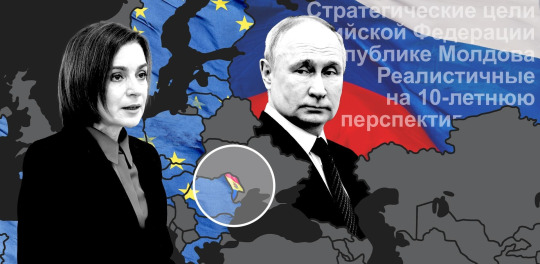
A document leaked from behind the scenes of the Kremlin presidential administration reveals Russia's plan to bring Moldova under its own umbrella by 2030.
The document, which has not been made public, is called "Strategic Objectives of the Russian Federation in the Republic of Moldova" and was created in 2021. Several key points of Moscow's strategy have also appeared over the years on the public platforms of pro-Russian parties and in speeches by politicians.
"The document is an interesting one, but it shows that they are one step behind the general situation because of the war in Ukraine and because of the regional capacity of EU countries and other international organisations to mobilise and face Russia's intentions to achieve this," Sergiu Diaconu, head of the Moldovan Prime Minister's Office, told us after we showed him the resulting strategy.
Against the backdrop of the Russian invasion of Ukraine, the government in Chisinau is increasingly promoting Moldova's rapprochement with the European Union. The head of state recently set a deadline for this goal. The year 2030.
This year - 2030, is also included in Russia's strategy as the deadline for gaining control over the Republic of Moldova and moving it away from the EU, NATO and other partners.
The document detailing Moscow's strategy was obtained by RISE Moldova together with an international consortium of journalists including Yahoo News, Delfi Estonia, the London-based Dossier Centre, the Swedish newspaper Exane Westdeutscher, Rundfunk and Norddeutscher Rundfunk, the Polish investigative station Frontstory, the Belarusian Investigative Centre and the Central European news website VSquare.
The document comes from the same Presidential Directorate for Cross-Border Cooperation that produced a similar strategy on Russia's plans to annex the Republic of Belarus. The strategy was drafted in autumn 2021, as was the Belarus strategy, with input from the Russian General Staff and Moscow's special services: the FSB, SVR and GRU. "There is zero percent [chance that] these documents are fake," according to the source who provided us with the documents.
The strategy was built on three spheres of influence: political and military, economic and humanitarian.
PRO-RUSSIAN POLITICAL AND BUSINESS INFLUENCE GROUPS
Strategic objectives in the political, military, military-technical and security spheres
In the short term (until 2022), Russia has set out to open a consulate in ATU Gagauzia, but this has not happened. The idea of opening a Russian consulate in Comrat has been promoted by former head of state Igor Dodon since 2012. At the time, Dodon was a member of parliament.
In 2021, an initiative group started collecting signatures in support of the idea, arguing that "many Gagauz residents have Russian citizenship and go to this country to earn money. Many citizens of the autonomy got married in Russia, have businesses there. We are linked to Russia by many threads".
Mihail Vlah is the chairman of the supervisory board of the public company Teleradio Gagauzia (GRT) and one of the organisers of the rally against price increases in the summer of 2022. His wife, Tatiana Vlah, owns 67% of Bakayan, which is on the list of Moldovan companies that Rosselkhoznadzor allowed to export to Russia in December 2022, after imposing an embargo on all agricultural producers on the right bank of the Dniester in August. Vlah denied at the time any link between obtaining the right to export to Russia and the organisation of the protest.
Mihail VLAH, civic activist from Gagauzia: I think Russia is generally not interested in Moldova. What is happening in the Transnistrian region is very important for Russia, because about 50% of the population there is Russian, they keep their weapons there and there are peacekeepers there.
As far as Moldova as a whole is concerned, I think Russia would naturally like to see Moldova in its sphere of influence. Just as Europe and America would like to see Ukraine, Moldova and Georgia in their sphere of influence.
And from Gagauzia, Russia wants nothing. We live as badly as the whole of Moldova. We pay 30 lei each for gas and electricity. Our products do not reach Russia. We, like our Moldovan brothers, suffer from the fact that there is war in Ukraine and from this relationship between the authorities of the Republic of Moldova and the authorities of the Russian Federation.
Another objective of the Russian Federation is 'Countering Moldova's collaboration with NATO', which it has set itself to achieve by 2025. And in the long term, i.e. by 2030, Russia wants to "form a negative attitude towards NATO in Moldovan society and political circles". This was one of the "10 priority objectives" promoted by the Party of Socialists of the Republic of Moldova (PSRM) in the February 2019 parliamentary elections: "We will not allow NATO membership and we will achieve the closure of the NATO office in Chisinau".

"Countering Romania's expansionist policy in Moldova" - Russia's medium-term goal - by 2025. In the same 2019 elections, the PSRM claimed that if it had a parliamentary majority, it would ban "unionist parties and movements". At the same time, the socialists promised that Moldova would "achieve full membership of the Eurasian Economic Union" (EEU). The objective is also reflected in the Russian Federation's strategy.
Also in the political, military, military-technical and security spheres, Russia wants to "broaden the electoral base of political forces in Moldova that advocate constructive relations with the RF", "create stable pro-Russian groups of influence among the Moldovan political and economic elite", 'developing cooperation in the politico-military sphere, including intensifying Russian-Moldovan contacts between the armed forces and law enforcement institutions' and 'increasing the level of Moldova's participation in CIS activities, including restoring the participation of Moldovan representatives in all Community formats as well as through the EEU'.
Dorin RECEAN, Prime Minister: From a military point of view, at the moment, they do not have the resources and circumstances to do much. They cannot advance on the Transnistrian side. They are not aligned enough.
But in terms of increasing insecurity and fear and anxiety and funding protests and different kinds of destabilization, that's what they're trying to do. And that coincides with the agenda of these groups that normally should be in jail, and their money - recovered by the government, because they stole money from the people.
"Russia sees the Shor Party as a reliable partner"
One party that satisfies the Russian Federation's agenda in Chisinau is Shor. The party led by fugitive Ilan Shor has openly shown sympathy for Moscow.
Alongside socialists and communists, Șor has not once spoken out against NATO, even threatening that our country's rapprochement with the military alliance could lead to war with Russia.
"As if it is not clear how our traditional partners in the East will react to our giving up our neutral status and joining NATO. [...] Do we want war? Maybe we should tell this witch (Maia Sandu - ed.) to stop bringing NATO trouble to our peaceful land," Ilan Shor said in early 2023.
Amid the large-scale war unleashed by Russia, Șor has shown his support for the aggressor state, campaigning against the sanctions imposed by the EU. "In the case of support for sanctions against Russia (by the authorities in Chisinau - ed.), I reserve the right to call people to the streets," Șor said in a Facebook video.
Moreover, back in 2021, the parliamentary party claimed that it aimed to establish cooperation relations with "Edinaia Rossia" (United Russia), the party that has been governing in Russia for more than a decade. A statement published by the Shor Party said that the Chairman of the Foreign Relations Committee of the Russian State Duma, Leonid Slutsky, said that "in recent years, the big problem has been that we have not had a reliable and long-term partner in Moldova for all our big companies. Today, however, we have found this partner in the person of Ilan Shor and the 'Shor' Party."
Ilan Shor and his party have been included on the US sanctions list for representing Russian interests in Moldova.
"Before the 2021 parliamentary elections, Russia was planning [...] to bring Moldova back into its sphere of influence. To support this effort, it worked with Russian citizens to create a political alliance designed to control Moldova's parliament and then support the adoption of a series of legislative acts in the interests of the Russian Federation," a document issued by the US State Treasury in October 2022 said.
We interviewed Marina Tauber in front of the government during the Sunday, 12 March 2023 protest organised by the Shor Party. Tauber denied that she was financed by Russia in any way.
Marina TAUBER, member of the Shor Party: No, we are not financed by Russia in any way. I declare this officially. And when people say or affirm this, please ask them to prove it to you and show you the concrete evidence. Otherwise, sorry, blah, blah, blah. I can't answer for all the people in the world. If they hired some of their employees, they have to answer. Mr Chernăuțan (Viorel Chernăuțeanu, head of the General Inspectorate of Police), as far as I heard from his briefing, said nothing about the Shor political party. If there are provocateurs here, what can I say? How can I tell you? I show you people who came from the district at our invitation. What the others are doing, I can't answer for the whole world.
PRO-RUSSIAN NGOS, CHURCH SUPPORT AND SPECIAL STATUS FOR THE RUSSIAN LANGUAGE
Strategic objectives in the humanitarian sphere
By 2025, Russia aims to create a network of "NGOs promoting the development of Russian-Moldovan relations" in Moldova and to provide "organisational, financial, legal and informational support for Russian-friendly NGOs". Igor Dodon founded such an NGO in 2021.
Transfers to the Moldovan-Russian Business Union
About the former president's "Moldovan-Russian Business Union", RISE Moldova wrote in the "Rubles for Dodon" investigation, in which we showed how from October 2021 to April 2022, i.e. in just seven months, more than 20 million Russian rubles (about five million lei) entered the association's Moldovan account. The money came from the "Delovaia Rossia" organisation in the Russian Federation, financed by businessmen close to the Kremlin and represented in Moldova by Igor Chaika, younger son of Yurii Chaika, Russia's Prosecutor General in 2006-2020.
Also on the humanitarian track, the authors of the plan set as their objectives "ensuring that the Moldovan authorities give up the idea of abolishing the study of Russian in schools" and "reconfirming the status of the Russian language as a language of inter-ethnic communication". The issue of the status of the Russian language on the territory of the Republic of Moldova is also reflected in the political programmes of the Socialist and Communist parties. In the latest political programme, approved in 2021, the PSRM "advocates strengthening the legislative framework on the status of the Russian language as a language of interethnic communication throughout the Republic of Moldova". And the PCRM notes in its electoral programme that "the state authorities will strictly observe the rules stipulating that Russian is the language of interethnic communication on the territory of our country". At the end of 2020, the parliamentary majority made up of socialists and the "For Moldova" Platform (made up of Shor Party MPs and defected MPs) passed a law in Parliament giving the Russian language special status. A month later, the law was declared unconstitutional and subsequently repealed.
Young people are also on the Russian Federation's radar. Russia aims to "expand opportunities for Moldovan students to receive distance education in Russian", to increase the quota allocated by the "Russian government to Moldovan students for studies at Russian universities with budget funding", and to create consortia between "higher education institutions of the two countries", open branches of Russian universities and develop an academic exchange programme.
Sergiu DIACONU, Head of the Prime Minister's Office: Interesting in this document, what we know exactly, but it is just a confirmation that they will put a lot of pressure on the so-called humanitarian and social zone. And here they can really cause some damage, because they are using institutions, including the Russian Cultural Institute here in Moldova, where you can see the permanent presence of the young generation, especially from the socialist side. It's a kind of enclave for the exchange of anything but cultural issues.
And the most interesting thing in the humanitarian sphere is that they want to increase the number of student organizations and the growing presence of the Russian language. They want to increase their media capacity.
The Russians' strategy also targets the church. According to the plan, by 2030 they aim to support "the Russian Orthodox Church in defending the interests of canonical Orthodoxy in the Republic of Moldova".
Mihail VLAH, civic activist from Gagauzia: The European Union is a very big and friendly family. It is like an intellectual, brain, technology. And Russia is Orthodoxy, a shared history of centuries that you cannot break with a pickaxe.
MAINTAINING DEPENDENCE ON RUSSIAN GAS
Strategic objectives in the commercial and economic sphere
"Maintaining the volume and legal framework for Russian natural gas supplies" is the objective with which the plan for the commercial and economic sphere begins.
Sergiu DIACONU, Head of the Prime Minister's Office: I would be very happy if people in Moldova could see this strategy. Because in the second point, in the economic sphere, they set out in the short term that they want to maintain the volume of gas deliveries to Moldova, which they did in 2021. But in this year, 2022, they have cut the supply by 40% and they are keeping us permanently under the prospect of the permanent cessation of gas imports from Russia. Every month we have this problem, that they say we're going to cut gas across the country. So how does what they say here stack up against what they do?
The goal of expanding "Russian-Moldovan cooperation in trade, economic and interregional relations" is similar to the mission of Igor Dodon's organisation. The "Moldovan-Russian Business Union" advocates the development of bilateral relations in the business environment of Moldova and the Russian Federation.
A Moldovan-Russian investment project is also AgroHub Moldova, a business started in Hincesti, which RISE Moldova wrote about last March. Specifically, the investment involved the creation of an agro-industrial and logistics centre, which aims to facilitate the export and import of agri-food and wine products. Worth $55 million, the project was also included in the protocol of the Moldovan-Russian Intergovernmental Commission meeting of 2 October 2020 and, according to the document, the agrohub was "aimed at improving trade relations between the Republic of Moldova and the Russian Federation". Except that, a few months after the publication of the RISE investigation, the lease contract for the public land on which the agrohub was to be built was terminated. Details, HERE
RISE Moldova sent requests for information to the Party of Socialists and the Party of Communists in which we asked them if there is any connection between the political and humanitarian objectives in the parties' programmes of activities and the exact same objectives found in the Russian Strategy. At the time of going to press, I had not received any reply.
Intelligence and Security Service of the Republic of Moldova: A multitude of subversive strategies, scenarios or plans with direct or indirect reference to the Republic of Moldova are circulating in the public space, elaborated by various experts or pseudo-experts. However, in most cases, these have little prospect of materialisation, as they are launched either to attract generous financial resources from sponsors or to manipulate public opinion.
"THE KREMLIN'S 'MOLDOVAN DIVISION
The document "Strategic Objectives of the Russian Federation in the Republic of Moldova" was reportedly drafted under the leadership of Russian Foreign Intelligence Service Colonel Igor Maslov, who headed the Kremlin's so-called "Moldovan Division" until 2021. We talked about this subdivision in the #Kremlinovich series of investigations.
Our partners' sources report that Andrei Vavilov, an employee of the "Moldovan branch", was among the authors of the strategy. Our sources in special services in several countries claim that Vavilov's superior is Victor Lisenko.
Vavilov and Lisenko are not just officials of Putin's administration. They also communicate with FSB General Dmitry Miliutin, who is in charge of the Moldovan-Transnistrian intelligence network. We talked about how Miliutin influences Moldovan politics in the investigation "FSB agents in charge of Moldova".
According to data obtained by RISE Moldova together with the Dossier Centre, from November 2021 to May 2022, Vavilov called Miliutin at least three times, and Lisenco is one of the most frequent phone contacts of the FSB Moldova coordinator. During the period mentioned, Lisenko called the general at least ten times, being surpassed in terms of calls only by Miliutin's wife - Natalia.
If Miliutin came to Moldova in 2016 when Igor Dodon took office as Moldova's president, then Lisenko paid a visit to Chisinau relatively recently. In June 2019, an official Russian government delegation led by Deputy Prime Minister Dmitry Kozak arrived in Moldova. Kozak was also accompanied by Viktor Lisenko, only his presence in the delegation was not made public.
Viktor Lisenko at the meeting between representatives of the Moscow and Chisinau governments. 24 June 2019. Photo:gov.md
In Chisinau, the Russian guests met with Maia Sandu, newly appointed prime minister in a coalition government with the socialists. The incumbent president at the time, Igor Dodon, also met with the Russian delegation. The parties discussed bilateral trade and Moldova's gas supplies, which later became the focus of Russia's ten-year strategy.
RISE Moldova contacted Vavilov on one of his phone numbers just a day before this story was published. As soon as he heard his last name, the man asked:
Andrei Vavilov
- But who is calling?
- This is Vladimir Thorik calling from Moldova.
- About what?
- I'm a journalist with RISE Moldova. I have a question about a document concerning Moldova. We have a document: "Strategic Objectives of the Russian Federation..."
- You... you got the wrong number... Then he hung up.
We sent an official request to the Embassy of the Russian Federation in the Republic of Moldova to find out which of Russia's strategic objectives had been achieved, but until the inquiry was published we had not received a reply.
#politics#moldova#romania#russia#nato#ukraine#maia sandu#putin#political science#kremlin#ukraine war#unionism
46 notes
·
View notes
Quote
“If you draw a map of states that have outlawed abortion and overlaid it with states that have right-to-work laws, it’s pretty much the same map,” Shaun Richman, who teaches labor history at Empire State University, told TPM. “Restricting the rights of labor and forcing women to go into labor really seem to go hand-in-hand.”
The Decades Of Successful Marketing Behind ‘Right-To-Work’ Laws
39 notes
·
View notes
Text
I was raised by a reporter mother who was an active part of her union, as was my stepfather. I grew up doing my homework in the back of union halls as my mother got elected, first to her executive board and then to the position of vice president of her local.
My spouse is a proud member of IATSE (the union for the crew positions for film, television, radio, theater, and other forms of live entertainment). He is the health and welfare trustee for his union. Most of our friends are card-carrying members of either IATSE or some other union.
We are Union Strong in my family and in my household. We support fair contracts and enforcement of safety regulations. We believe worker's rights are human rights. We believe in supporting labor worldwide. Labor is the most diverse cause around. Everyone needs to eat, everyone needs a living wage. We support the WGA and the SAG-AFTRA strikes. The IATSE union has kept food on our table and our children in health care. WGA and SAG-AFTRA are our sister unions and we believe in supporting them whole heartedly.
In the immortal words of the Irish punk bands Black 47 and The Dropkick Murphys:
"FUCK THE BOSSES AND THEIR SCREWS!"
11 notes
·
View notes
Text
The B.C. Government Lawyers Association (BCGLA) is speaking out against the newly tabled Bill 5, which will allow government lawyers interested in unionizing to join the Professional Employees Association (PEA) for government-licensed professionals, but does not allow them to form their own union.
"It's not up to employers or governments to choose unions," said Gareth Morley of the BCGLA, the association representing government civil lawyers in the province.
"It's up to the workers involved to decide whether they want to join a union and if so, which one they do."
The bill, tabled by B.C.'s finance minister Katrine Conroy on Thursday, amends the Public Service Labour Relations Act to include civil lawyers who write legislation, advise the province, and represent the government in child protection matters. [...]
Government lawyers 'have the same rights as everyone else': BCGLA
Morley says the BCGLA applied for union certification with the Labour Relations Board (LRB) in November, arguing they "have the same rights as everyone else under the Labour Relations code."
During that process, Morely says the association and province were required to share their arguments for or against certification. The LRB would make the final decision.
Morley says if the new bill passes, the LRB won't be able to certify their union application, and the association's only option would be to challenge the legislation for being unconstitutional. [...]
Continue Reading.
Tagging: @politicsofcanada
29 notes
·
View notes
Text
The expert fuckers who broke this world never get to speak again.
—Godspeed You! Black Emperor
On March 29, 2023, graduate student instructors and graduate student staff assistants with GEO3550 (AFT) at the University of Michigan began an illegal strike for a living wage, increased healthcare coverage, workplace protections from ICE, the funding of a municipal non-police, unarmed emergency response, and an end to restrictions around the childcare subsidy. After months of bargaining with HR, grad workers seemingly had enough, and walked out of their classes and departments to march through the university campus.
Since September 2022, GEO members had adopted a “bargaining narrative” that would guide the rhetoric and basic principles behind their bargaining platform, both in their presentations to academic HR and to the public. The narrative was centered on issues of affordability: grad workers can’t afford rent, the university can afford to pay them money, grad workers should be able to afford to live in the city that their institution is in, the university can’t afford to go any amount of time without grad labor. For a labor union affiliated with the American Federation of Teachers with more than fifty years on the books, this narrative seems to work. It seems reasonable, approachable, important. Yet the narrative created a very narrow scope of political possibility for the union—a union that had previously adopted abolitionist, anti-policing demands, and had taken the radical leap of striking against COVID-19 policies and campus policing. The affordability narrative constrained the framing of our demands—what can we demand, and what kinds of actions and risks can we take when we are politically constrained by a single issue (the wage)?
This group of rabble-rousers celebrates the strike, not just because we want a living wage (and lord knows we’d breathe more easily every month if we did), but because we want everything. For us the strike is just the beginning of our struggle: we want a life free of exploitation and work, and we want it for everyone. We want time for our families, lovers, friends, and comrades. We want to dream, conspire together, play and party together. We want a blunt in every hand and every cop run out of town. We want the end of the university as we know it, and we want to dedicate ourselves to whatever the fuck we think would be cool (for the night, for the week, for the year, for our lifetimes). We want so much more than the union contract lets us bargain for, and we want it now, not just when this strike eventually ends and we accept a contract for the next 3 years. We want everything. Everything we want is “permissive,” and we are the only ones who can give ourselves permission to take those things.
And so we strike—striking not only for wages, but for life. The picket lines breathe life back into us, after all of the breaths we’ve expended for an institution that could never love us back (and to pretend that it will is a fool’s errand). We strike against business as usual, and we strike to take back our lives:
1) We began bargaining with the “reasonable” request that the university only be allowed to steal $170 million worth of our labor from us every year ($200 million in profits – $30 million to cover our demands). What if, instead, we had asked for everything?
2) In the MIT calculator for a living wage, we live alone (one adult, no kids) and we spend less than $11 a day on food or drink ($4,010/365 days = $10.99 per day). Is that living? (and also, what does it mean to count such a value. We are not asking for all the money they can give us—although that wouldn’t be bad, but it isn’t really like a UBI demand).
3) It seems often that people want to be told they are being reasonable. This is a fear, the fear of being unreasonable. It is an old fear, a modernist fear, a fear of being labeled one of the “crazies” like the mad, like the colonized, like women, like queer folks. Often, we feel compelled to prove that we’re “not like them,” we present elegant arguments, we read books, we’re getting our PhD—we’re reasonable. But maybe we shouldn’t be. Maybe being reasonable, having reasonable demands, only means being like the University. And the University is our enemy.
4) How did they convince us that we were supposed to suffer? Was it the promise of some pretty bourgeois future in the capital? We beg those of you who believe in that future to look at academic job reports. Maybe you believe there’s some salvation in industry. We beg those of you who believe in that future to look at climate change reports.
5) We could say that there is no future. In some sense this is true. For some people, the future is bright, it’s shiny, it has flying cars, and we’re living in some miraculous post-scarcity world. But we know that future isn’t coming. The minerals required alone would destroy half the globe, and Elon Musk would need to destroy the atmosphere, cooking us with solar radiation, in his cockamamie schemes to get off the rock. But there are other futures. There are futures together. There are futures spent growing food, cooking, and building homes with people we love, like people used to. There are futures where we wake up and work together to make clothes, sing silly songs with each other’s kids, take care of each other while we grow old. There are futures where everything we make is ours. There are futures where we demanded, and took, everything.
6) What is everything? Everything is not some abstract totality, the dream of state-makers and capital. It’s always having a cool place to sleep and hang out with your friends; it’s having fresh vegetables from the community gardens and farms, good cuts of meat from the chickens, goats, and whatever else we want, and homemade wine and beer made by and for those you love; it’s clean, fresh water; it’s never being forced to do work that doesn’t directly make your or your community’s life better; it’s communities of care where no one ever gets to tell you what sort of healthcare you need; it’s summer nights with a blunt in hand, tripping on mushrooms, and watching a meteor shower with your friends; it’s working with your friends to deck out one of those beautiful lowriders and going cruising down the open road; it’s no more cops on campus, in our cities, in the world; it’s more than you can imagine. Communism is just this: skipping class to go swimming, but for a million years.
7) Demanding everything also means the abolition of the wage. It is the ending of a way of life that decides if we live or die based on how much value we generate for someone else. It is the end of a world where bargaining over wages is not necessary for our day-to-day survival. Our dignity and our lives shouldn’t be rhetorically or politically reduced to a question of affordability, nor can it be reduced to a debate on if we are deserving of anything.
8) Neither the university, nor their lawyers, nor the labor contract process, nor the specifics between permissive and mandatory subjects of bargaining, nor the distinctions between hard and soft pickets, nor the courts and their injunctions can contain or repress this demand for everything. The demand for everything exceeds the existing processes and beckons us out of these containers of repression, respectability, and rules. We can choose to heed the siren song of a life where we have everything, or we can limit our imaginations and our actions to cut ourselves off from possibility.
9) University politics cannot be understood if the university as a site of desire for common life is ignored. Herein lies its contradictory character. Especially in the humanities, the secular collapse of the capitalist economy drives anyone who minimally hates work to the university, seeking in study a respite from the malaise that infects every other job option. At the same time, here we are more overworked than most people doing what David Graeber has called “bullshit jobs.” Yet the bullshit cannot hide that in between class, teaching and research, there is sometimes a brief moment of actual thinking. It is in the strike that we seek to expand these moments—small prologues of a life worth living. Both macho chatter about weak grad students as opposed to brutish workers outside the campus, and cosmopolitan Jacobin-esque punditry about the enlightened student organizer both ignore this crucial fact.
10) “We need your ideas, we need your insights, and most of all, we need your dreams.” This is it: in the highest stage of capitalist nihilism, the biggest lies are always shouted out as they were everybody’s aspiration. This sordid little incantation is what drives the contemporary university’s factory of unwept tears. The fact that this industry works on an image of a continually extended sameness into the linear future should foment distrust—distrust felt deep in the pits of our stomachs. The appropriation of every struggle, every radical negation, every true dream to break free from this hell-world, speaks to how pernicious liberalism’s adage can be. First, it demands that every collective aspiration be reduced to whatever makes one a “decent living”. Second, it ensconces it in the puerile and sanitized language game of ambitions, dreams, in sum, change. Everything is to be made a little bit better; nothing is to be destroyed. These cowards hate above all our hatred, our anger, our force. And the wish to dismantle this war-affect will come not only from outside, but also from within our movement.
To be clear, this critique comes from within GEO, from within the university—in but not of it, if you’ll forgive the cliché. We have no quarrel with the friends we make on the picket line, nor do we have beef with the rank-and-file folks we haven’t met yet (we don’t like the reactionaries in and around the union, but who does?). We echo the calls of the disaffected communists and disillusioned anarchists in so-called California against the UC, and we salute the brave folks who ran up on and attacked rapist frat houses in Nebraska, Kansas, Massachusetts, and elsewhere. We celebrate and honor the dropouts, the proles, the fellow travelers trapped behind bars and murdered by the state. We’re hungry for more than what union politics can give us, we’re sick of the university containing our rage. Let’s take action that pushes our demand for everything to its fullest extent: let’s feed each other, whether in expropriated dining hall food or in our strike kitchen. Let’s take campus back from administrators and security. Let’s make the football field a fuck forest. Let’s have dance parties in North Quad and print zines together in Mason. Let’s take naps in lecture halls on purpose. Let’s cut class. Let’s enjoy spring. Let’s demand everything.
#The only living wage is everything#demand everything#anarchism#communism#abolition#Marxism#unionism#GEO#University of Michigan#zine
14 notes
·
View notes
Text

The power of #friendship 💖@lovesaramaeve #unionism #union #democracy #unitarian #unitarianuniversalism #universalist #churchofunion???
#unionism#divine friendship#church of Union#unitarian universalism#unitarianism#autism#aspergers#autistic meltdown#actually autistic#audrey hepburn#advertising#black and white#artists on tumblr#strawberry fields forever#the beatles#talking to people#friendly discussion#love yourself#sharing is caring#ascension#spiritual awareness#spiritual journey#spiritual awakening#spirituality#meditation
2 notes
·
View notes
Text
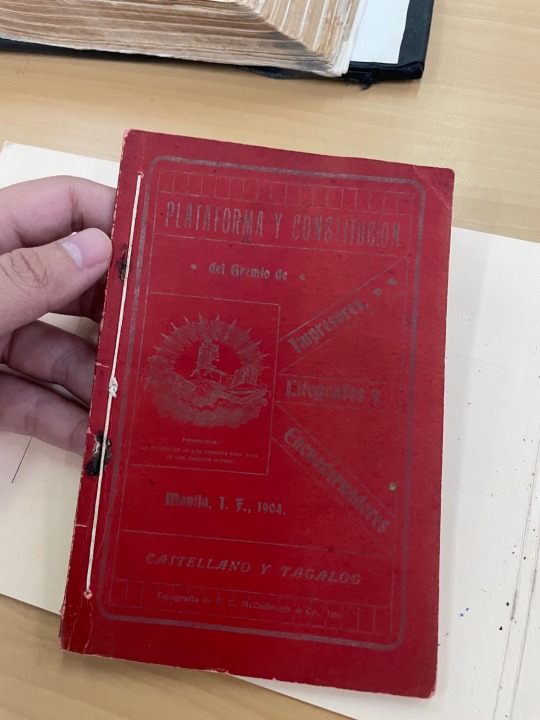
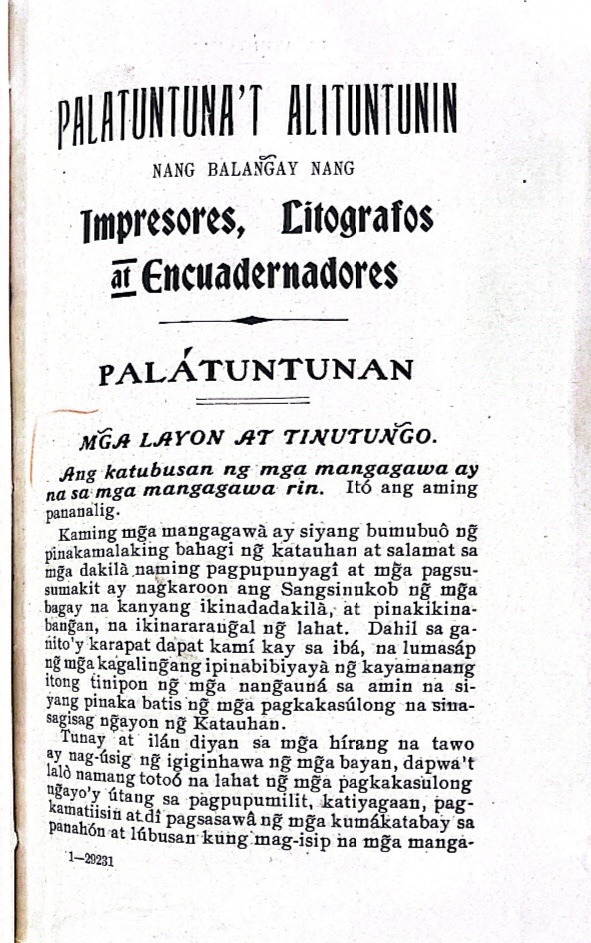

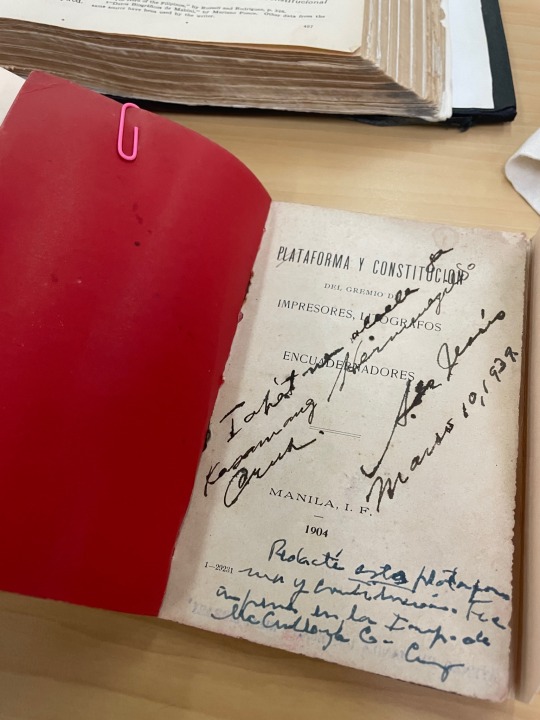
archive finds....this red booklet is the platform and constitution of the gremio de impresores, litógrafos y encuadernadores/balangay ng mga tipografo, litografo at encuadernador! (in english something like: union of printers, lithographers and bookbinders. it's dual language, in both spanish and tagalog! this is from 1904!
their principle is a quote from marx: la redención de los obreros será obra de los obreros mismos/ang katubusan ng mga manggagawa ay na sa manggagawa rin ("the emancipation of the working classes must be conquered by the working classes themselves" from the general rules of the first international)
11 notes
·
View notes
Text
From the article:
[....]
New York City Comptroller Brad Lander, who filed the request for the independent review of the company’s labor practices, said in a statement that the results of the vote showed that investors want the company to be transparent about its treatment of union organizers.
“Investors who want to see a thriving, successful and flourishing Starbucks sent a strong message that the company must live up to its own policies and values,” Lander said in a statement after the vote. “The majority support from shareholders for our proposal reflects a growing demand for an honest accounting of the discrepancy between Starbucks’ purported values and management’s anti-union behavior.”
Read more.
8 notes
·
View notes
Text
Still absolutely seething at this years 12th. They hanged an effigy of Michelle O'Neil from a noose on the bonfire. Hundreds gathered round it with their families to cheer at it being burnt. And nothing will be done about it. In a normal country that never would've been aloud to be up, let alone burnt and every single person that attended should've been arrested for participating in a hate crime. Absolutely fucking disgraceful how the police let this happen every year because of "culture" and no one ever is held accountantable.
The hatred after the election this year has been insane. They can't bear to see a Catholic and a Catholic woman at that hold the most powerful position in the country.
It's just fucking insane how tolerant this place is of intolerant and hateful beliefs.

#12th july#11th july#marching season#ireland#northern ireland#loyalism#unionism#nationalism#uk#sectarianism
7 notes
·
View notes
Photo



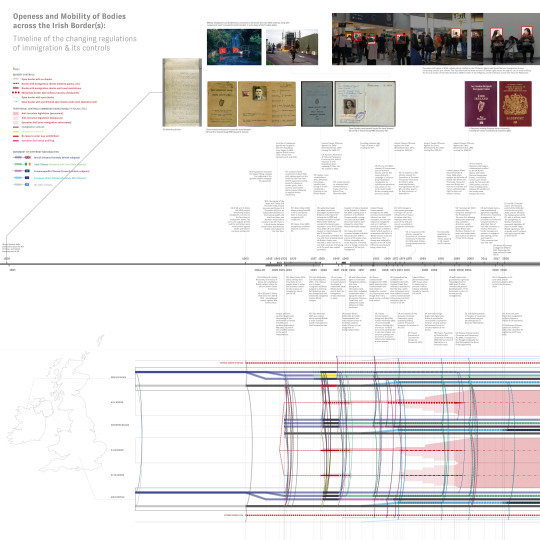

youtube
youtube
youtube
youtube
A Body, A Borderland: the Biopolitics of the Irish Border(s), 2019-2020 The Irish border is a political question, but also a spatial one.
Cartography is an instrument of power. The border spatialises state power, and in Ireland, embodies long-running conflicts over self-determination. Despite its openness, it remains a limit of jurisdiction, and for marginalised bodies, such as women seeking abortions or transgender people, a source of systemic violence. The Irish border's spatial site is not only on the map, the territory, but in fact is carried by each body.
“Sovereign territory” is idealised fiction. The 1924 Irish Boundary Commission’s failed attempt to redraw the border demonstrably exemplified problematics of dividing interconnected peoples, economies, geographies, with a line. Mapping Ireland was inherently colonial, and the Irish Boundary Commission’s arbitrary interpretation of “wishes of inhabitants” continues legacies of the cartographic gaze’s power, vested in few, imposed on bodies of many.
When territory as an idea engenders violence, this project proposes deterritorialising sovereignty, basing it on the space of an individual body as a provocation. In Derry/Londonderry, where its bipartisan names are part of the conflict, what becomes of urban life if our association with a state is not based on territorial coincidence, but the body’s choice? May urban flows of people become new maps of the nation, with architecture as the boundary treaty? When the nation is built on the body, how may the body rebuild our understanding of the conflict, and the nation?
This research was featured as an article on e-Flux, Inscribing Borders on Bodies. This work was also part of a Feminist Constitutions symposium on using methods of arts and design in reimagining new processes of 'constitution-ing'. Calvin has also spoken at the London Migration Film Festival about ideas from this work.
#Youtube#cartography#geography#research architecture#forensic architecture#architectural association#architecture theory#archtecture#politics#conflict#nationalism#unionism#territory#irish border#borders#e-flux#writing#critical theory
4 notes
·
View notes
Text
It’s done.
#fanfiction#fanfic#disco elysium#de#harry du bois#jean vicquemare#kim kitsuragi#unionism#trade unions#titus hardie#trant heidelstam
6 notes
·
View notes
Link
TWO MEN HAVE apologised after a video emerged on social media appearing to show a group of people singing a song that mocks the murder of Michaela McAreavey.
The video appears to have been taken in an Orange Hall in Northern Ireland.
...
Footage of the incident, which shows a number of people singing about the murder, was posted online in recent days but began to go viral last night.
McAreavey, the daughter of GAA manager Mickey Harte, was strangled in her room at the Legends Hotel in Mauritius while on honeymoon on 10 January, 2011.
The teacher, who had married husband John McAreavey ten days earlier, was attacked after she returned to her room alone and disturbed a burglary.
No-one has been convicted of murdering her.
'Orange Culture’ is about hating Catholics and nothing more. Fuck the Orange Order
#northern ireland#ireland#irish politics#politics#orange order#loyalism#unionism#michaela mcareavey#anti irish racism
4 notes
·
View notes